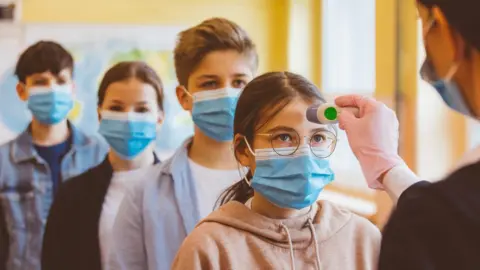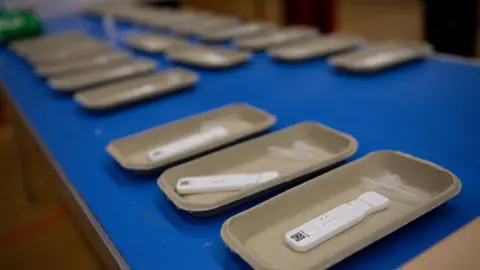Covid: Schools and colleges to get tests from January
 Getty Images
Getty ImagesCoronavirus testing is to be rolled out in schools and colleges from January.
Pupils and staff identified as close contacts will be offered a lateral flow test each day of a self-isolation period, the Welsh Government said.
Those who test negative can continue going to school or college, while those who test positive would self-isolate and book a confirmatory test.
Health Minister Vaughan Gething said training for school staff would begin this week and continue in January.
'Laughable'
He added that testing would not be compulsory.
But Laura Doel, director of school leaders' union NAHT Cymru, said the plan to roll it out next term was "laughable".
She said: "The implications for schools to mass test on a national scale is huge.
"For the health minister to say it can be rolled out at the start of next term when the teachers have to carry out the tests and they haven't been trained is laughable."
She added: "Ministers have an awful lot of work to do to repair the damage that has been done to their relationship with the teaching profession."
How would the testing work?
Currently, pupils and staff identified as close contacts from a positive test must self-isolate for 10 days.
However, under the new plans they would be asked to either self-isolate as normal or take a lateral flow test at the start of the school day for the duration of their self-isolation period.
Schools and colleges will be offered support, equipment and training, and all special school staff will be offered weekly testing.
Eithe Hughes, director of the Association of School and College Leaders in Wales, told BBC Radio Wales the plan had advantages in reducing the number of people isolating and easing concerns, but she also had questions over how it would work.
Ms Hughes said: "Then I'd be wondering about why I'm hearing about policy on the media in the last week of term when there's already so much else to be done.
"Then there are some questions around the logistics of actually carrying out this mass testing in essence... if it's a large secondary school and you've got multiple year groups involved, what does that look like for a school every morning for 10 days?
"Then again, if there is a positive, and additional contacts considered, does that mean the process starts again for another 10 days?"
Ms Hughes also questioned how school staff would have time to administer or oversee testing and how schools would find space.
She said: "Where are the teachers and staff who are actually able to have space to oversee this? Teachers at the minute are very thin on the ground and supply staff are very difficult to find.
"Where does the time come from in a working day?
"The principle is laudable and I don't think anybody would say the principle isn't correct, but rolling this out in a school setting could present significant difficulties."
'The devil is in the detail'
Jackie Parker, head teacher at Crickhowell High School in Powys, said she welcomed the scheme but further details were needed.
"We want to have the minimum disruption we can to have the tests offer some security for families and teachers," she said.
"The devil is in the detail... it's working out how we can do this when it's going to be, as far as I know, staff in school doing this [the tests] and obviously there's training, protocol, informing parents of exactly what's happening so we're going to need all the detail and time to prepare.
"Schools have worked miracles over the last few months, as have other key workers, and we will do our very best to facilitate this but I've got 967 students in the school, so a year group bubble may be 150 so it's working out the careful logistics of this."
Ms Parker called for teachers to be vaccinated as key workers so they would not need to undergo testing.
"We would be able to carry on and we want to minimise any disruption in the learning of young people."
 PA Media
PA MediaEducation Minister Kirsty Williams said the rollout has been confirmed following talks with Public Health Wales and the children and schools Technical Advisory Cell.
She said the plans would "play an integral role... to deliver maximum learning with as minimal disruption as possible".
"We recognise that it has not been easy for pupils and staff who have been required to self-isolate as a result of having been identified as a close contact and we recognise the impact it has had on face-to-face teaching."
A parent's view on testing children in schools
Julia James, from Porthcawl, said she was supportive of the plans and would want her daughter, who is currently self-isolating, to receive tests.
"There's no consistency between various schools, some have been hit harder, so it's been quite unfair when it comes to predicting grades," she said.
"These tests are only going to help that.
"I don't understand anyone who would not be for it, as long as the teachers are happy as it's going over and above their job description."
Are lateral flow tests reliable?
Lateral flow testing detects the presence of the Covid-19 viral antigen from a swab sample and produce results within 20 to 30 minutes.
Earlier this month, a senior NHS adviser defended the mass use of these tests following concerns about their accuracy.
Dr Susan Hopkins, chief medical adviser to NHS Test and Trace, accepted there had been "false negatives" but stressed the policy was a "game-changer".
A study found the tests missed 50% of cases and some scientists fear people could start to ignore health advice.
Testing is planned to be introduced to all schools and further education settings, including primary and childcare staff, the Welsh Government said, but will be phased on levels of risk, starting with secondary schools and further education institutions.
Mr Gething said testing by itself "cannot eradicate the risks associated with contracting and transmitting Covid-19".
"Testing... needs to be taken alongside other infection prevention control measures, including appropriate social distancing and hand hygiene measures."
He said mass testing in parts of Wales would "help inform how we can successfully deliver lateral flow testing in schools and other education settings in the future".
